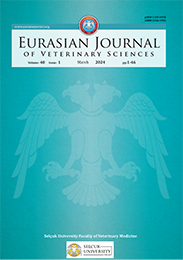| 2000, Cilt 16, Sayı 1, Sayfa(lar) 129-133 |
| [ Türkçe Özet ] [ PDF ] [ Benzer Makaleler ] |
| The Effect of Oil Refinery By-Products on Reproductive and Rearing Performance in Japanese Quail |
| Süleyman Dere1, Tahir Balevi2, Şeref İnal1, Varol Kurtoğlu2, Alper Yılmaz1 |
| 1Selçuk Üniversitesi Veteriner Fakültesi, Zootekni Anabilim Dalı, KONYA 2Selçuk Üniversitesi Veteriner Fakültesi, Hayvan Besleme ve Beslenme Hastalıkları Anabilim Dalı, KONYA |
| Keywords: Soapstock, energy source, japanese quail, performance, fertility |
| Downloaded:1478 - Viewed: 2496 |
|
ln this study, the effect of oil industry by-products as energy source on daily feed intake, egg yield, feed conversion rate, fertility, hatchability, and live-weight in japanese quails (Coturnix coturnix japonica) 120 female and <\Q male quails with weeks old were used in this study. Quails were divided into lour main groups consisting 10 subgroups having 3 female quails in each of subgroups. Following three month lasting egg production period, one male quail was placed into cages ol each subgroups Groups were fed diets. Consisting in rates of % 2 sunflower crude oil (HY), acidulated sunflower soapstock (AY), volatile matters (UM) and sunflower soapstock (SSI during investigation period. Egg production percentages ol groups were lound as 68.75. 69.45, 67 41 and 64.45 % resp.(P>0,05) Average fertility percentages were 80.46, 80-19, 77.98 and 73,66 % resp. (P>0.05). Hatchability values ol groups were found as 51.41. 51.40, 48.67 and 49.34 % resp. (P>0.05). Feed intake in four groups were varied in ranges of 33,89 and 35,83 g/day/quail. Feed amount consumed for production ol 12 eggs in four groups was found as highest in SS group, lowest in HY group. SS group with respect to eventual female quail live weight was significantly lower than other groups (P<0.05) As a result, it was concluded thai supplementation of diets with tow cost AY and UM instead of crude oil has no negative effects on performance and reproduction.
|
| [ Türkçe Özet ] [ PDF ] [ Benzer Makaleler ] |




